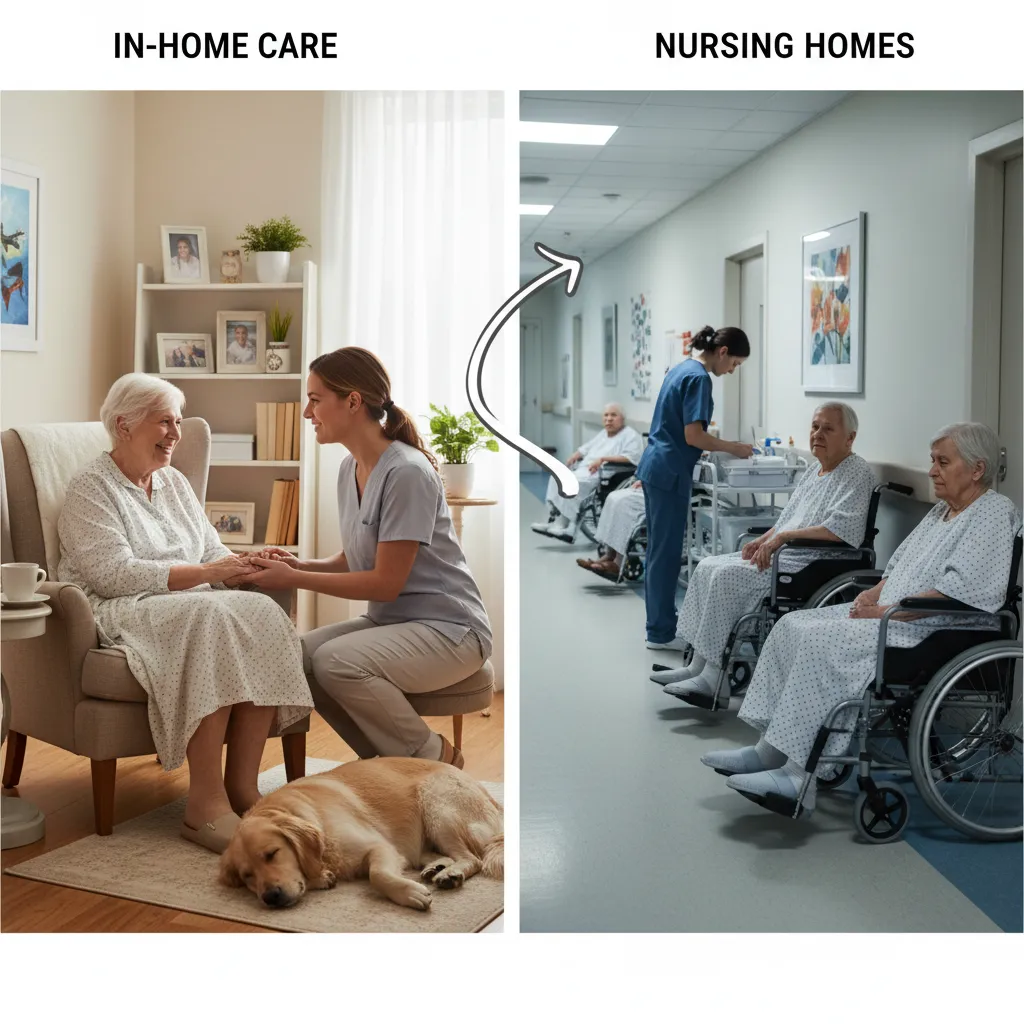Benefits of In-Home Care vs. Nursing Homes for Seniors
As families face the realities of aging, one of the most important decisions they must make is choosing the right type of care for their loved ones. Seniors often require assistance with daily tasks, medical needs, and emotional support, which can be provided either through in-home care or placement in nursing homes. Both options have unique benefits, challenges, and costs that families should carefully evaluate. This guide explores the differences, advantages, and potential drawbacks of in-home care compared to nursing homes, helping you make the best choice for your family’s situation.

Understanding In-Home Care
In-home care refers to professional caregiving services delivered within the comfort of the senior’s home. Care can range from a few hours a week of assistance with daily living activities to 24/7 skilled nursing care. Many families prefer this option because it allows seniors to maintain independence and familiarity with their surroundings.
Services in in-home care can include personal hygiene assistance, medication management, companionship, light housekeeping, and transportation. In cases where medical needs are higher, skilled nurses and therapists may be part of the care plan. This flexibility makes in-home care one of the most customizable solutions for elderly individuals.
Understanding Nursing Homes
Nursing homes, also known as skilled nursing facilities, provide 24-hour medical care and supervision in a residential setting. They are often the choice for seniors with complex health conditions, mobility issues, or those who cannot be safely cared for at home. Unlike assisted living facilities, nursing homes have licensed medical staff available at all times to manage residents’ health.
In a nursing home, seniors receive structured care, meals, medication management, physical therapy, and access to doctors and nurses. Social activities and community engagement are also part of the environment, which can benefit seniors who are at risk of isolation. Families often choose nursing homes for peace of mind, knowing their loved one has continuous access to professional medical support.
Comparing Comfort and Familiarity
One of the biggest benefits of in-home care is comfort. Seniors can remain in a familiar environment surrounded by personal belongings, which helps reduce stress and maintain emotional well-being. Aging in place allows older adults to continue their daily routines and stay close to family, neighbors, and local communities.
By contrast, moving into a nursing home requires adapting to a new environment with shared spaces, schedules, and rules. While some seniors adjust well, others may find the transition challenging. However, nursing homes do provide structured activities and opportunities for socialization, which may not always be possible with in-home care.
Level of Medical Support
Medical care is a major deciding factor between in-home care and nursing homes. In-home caregivers can handle basic health monitoring, medication reminders, and routine assistance. For seniors with serious medical conditions, specialized in-home nursing services can be arranged, but this often comes at a higher cost.
Nursing homes, on the other hand, provide continuous access to doctors, nurses, and therapists. Seniors with advanced dementia, chronic illness, or post-surgery needs often benefit from this structured medical attention. Families who prioritize constant medical oversight may find nursing homes the better option.
Cost Comparison
Cost plays a critical role in deciding between in-home care and nursing homes. In-home care is often billed by the hour, which can make part-time assistance affordable. However, for seniors who require round-the-clock supervision, the costs can exceed those of a nursing home.
Typical Cost Factors
- In-home care: hourly rates, medical vs. non-medical care, number of hours needed
- Nursing homes: room type, level of medical support, amenities
- Insurance and government aid: Medicare, Medicaid, and long-term care insurance
Nursing homes typically have a flat monthly fee, which may be easier to predict but is often high. Families must explore all payment options and consider what works best for their financial situation.
Social Interaction and Emotional Support
Isolation is a concern for seniors receiving in-home care, especially if they live alone. Caregivers can provide companionship, but social opportunities may be limited to family visits and community engagement. Seniors who value independence may prefer this, while others may struggle with loneliness.
Nursing homes provide structured group activities such as games, exercise classes, and community events. These opportunities for interaction can improve mental health, reduce depression, and foster a sense of belonging. The benefit of nursing homes in this area is their ability to create a community of peers, something not always possible with in-home care.
Flexibility and Independence
In-home care allows seniors to maintain independence and control over daily routines. They can decide when to eat, sleep, and participate in activities, without being bound by institutional schedules. Families can also adjust the level of care over time as needs change, providing a flexible solution.
Nursing homes, by necessity, operate on structured schedules to manage large numbers of residents. While this ensures consistency and organization, it can also reduce personal freedom. For seniors who value autonomy, in-home care often provides a better quality of life.
Family Involvement
With in-home care, families often remain closely involved in daily life. They can visit freely, monitor care, and participate in decision-making more actively. This hands-on involvement can strengthen family bonds and provide reassurance that their loved one is safe.
In nursing homes, family members may feel less involved due to structured visiting hours and professional oversight. While families can still engage in care planning, the direct interaction may be less frequent compared to in-home arrangements. However, this can also relieve family members from the burden of being primary caregivers, which may reduce stress.
Safety Considerations
Safety risks differ between the two care options. At home, seniors may face hazards like falls, poor lighting, or limited emergency support. Families must ensure that the home is adapted for safe aging, with modifications such as grab bars, ramps, and medical alert systems.
Nursing homes are designed with senior safety in mind, offering wheelchair accessibility, round-the-clock supervision, and immediate medical attention. For seniors at high risk of accidents or those with memory issues, a nursing home may be the safer choice.
Long-Term Outlook
In-home care works well for seniors who have moderate needs and wish to remain at home for as long as possible. However, as medical and mobility issues progress, families may eventually need to transition to a higher level of care such as assisted living or nursing homes.
Nursing homes, on the other hand, can accommodate seniors through different stages of health decline, offering consistent care as needs increase. Families who anticipate long-term, complex medical support may choose to place their loved one in a facility earlier rather than later.
Making the Right Decision
The choice between in-home care and nursing homes depends on the senior’s health condition, personal preferences, family involvement, and financial resources. There is no one-size-fits-all answer, and many families combine the two - starting with in-home care and transitioning to nursing homes when necessary.
Key Factors to Consider:
- Level of medical care required
- Desired level of independence
- Family’s ability to be involved
- Budget and insurance coverage
- Emotional and social needs
Taking time to assess these elements will help families make the best decision for their loved one’s comfort and well-being.
Conclusion
Both in-home care and nursing homes offer unique benefits for seniors, depending on their health, lifestyle, and personal preferences. In-home care provides independence, comfort, and flexibility, while nursing homes ensure round-the-clock medical care, structured support, and a sense of community. The key is to evaluate individual needs, financial realities, and family involvement before making a choice. Ultimately, the right care option will provide safety, dignity, and peace of mind for seniors and their families.











